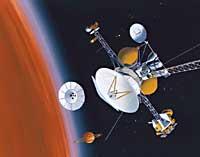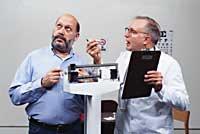What new will 2005 bring us?

Last year the missions to Mars, the decline of biodiversity and human cloning have been some of the main themes. Anyone who had not heard of these issues knows it at least now — or at least should know it after the awnings he had heard for a year. Among other things, there were also news of the footprints of a tiny man found on the island of Flores, in Indonesia, the photo of the electrons and the sequencing of the rat genome.
Of course, we will remain attentive to these issues, but in 2005 other topics will be the stars of scientific journals, which in the journal Science have highlighted seven. Some of them, like nanotechnology, have been treated one more year. In fact, it seems that the era of nanotechnology is still to come, since this field of science is still in its beginnings.
This year, governments will have to start developing the regulation of nanotechnology, since, as it is so new, there is no international regulation regulating research. The concerns, however, have already appeared both environmental and health-related, and if one wants to guarantee safety in both areas it will be necessary to agree on an international regulation.

And another of the topics we've talked about last year, and which is fashionable in early 2005 is a mission from NASA and ESA: Cassini Huygens in Saturn. When this probe was in orbit around the Titan satellite of Saturn, the two sections that composed it were distributed and Huygens entered the atmosphere of Titan to study the surface of this cloud-covered moon. As this mission advances, it will be something that counts.
Canibalismo in cells
Perhaps the use of the word canibalismo is a little more; experts use the word apoptosis to designate the autophagy that occurs in cells. The problem is that cells ‘eat’ some internal parts. The cell reuses these parts. And this topic will be on everyone's lips and all this year. Apoptosis is of great importance in the spread of diseases such as cancer, lupus, and other diseases of the immune system.
Apparently, apoptosis is a two-mouths sword that helps spread the disease on the one hand, but on the other, it puts obstacles. Therefore, research on apoptosis will serve to know the mechanism of propagation of many diseases.

And this year, more health-related topics, such as anti-obesity drugs, will be addressed. Needless to say, obesity is a problem that more and more people have and is the second cause of death in the United States, behind tobacco. It is a serious problem and medicines can give solution. But the debate is also not far away, since the U.S. administration has facilitated access to the market for anti-obesity drugs and will be sufficient for a one-year trial period to demonstrate their safety and put them on sale.
Do not forget genetics
And if you want to continue with the most cutting-edge news of science, don't forget what you've heard and learned from genetics so far, because this year genetics will also give a lot to say – and surely in the coming years –. The journal Science has highlighted the project HapMap, a project of one hundred million dollars to investigate the genetic base of diseases.
HapMap is a project that analyzes the haplotypes of people of different races. Haplotypes are chromosomal assemblies that are inherited simultaneously and are used to search for genes that cause the disease. However, there is still much time left between the results of this gigantic project and practical applications.

And to finish, the other two topics mentioned, although they have to do with science, are politics and administration. On the one hand, the issue of nuclear arsenals is mentioned. There are countries that, once again, will threaten their nuclear arsenals such as North Korea, Brazil and Iran. They have included it among scientific subjects, but as you see, it has a weight in politics and not in science. On the other hand, they underline the creation of the European Research Committee, whose structure and functioning will be decided throughout 2005.
These seven great topics have been announced by the journal Science for this year that we have just started. We will see it in the coming months that have been successful in the announcement. However, it is clear that this year we will talk about many other issues related to science. Let it be so.
Published in 7K.
Buletina
Bidali zure helbide elektronikoa eta jaso asteroko buletina zure sarrera-ontzian








